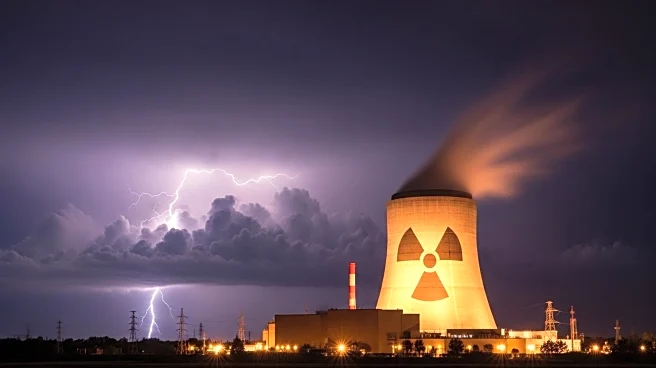What is the story about?
What's Happening?
Russia has disconnected the Zaporizhzhia Nuclear Power Plant from Ukraine's power grid, aiming to integrate it into the Russian network. Ukrainian Foreign Minister Andrii Sybiha announced the move, marking an unprecedented action in nuclear energy history. The plant has been in blackout mode for nearly three weeks, relying on backup generators for safety systems. Sybiha accused Russia of violating nuclear safety protocols and attempting to deceive the International Atomic Energy Agency (IAEA). The plant, Europe's largest, has been under Russian occupation since March 2022, with its reactors shut down but still requiring external power for cooling nuclear fuel.
Why It's Important?
The disconnection poses significant risks to nuclear safety, potentially leading to a nuclear incident. It highlights geopolitical tensions and the strategic importance of energy infrastructure in conflict zones. The situation underscores the vulnerability of nuclear facilities in war, raising concerns about international nuclear safety standards and the role of global organizations like the IAEA in monitoring and preventing nuclear crises. The move could affect regional stability and energy security, with potential repercussions for European countries relying on nuclear energy.
What's Next?
Ukraine and international bodies may increase diplomatic efforts to address the situation, seeking to restore the plant's connection to Ukraine's grid. The IAEA's involvement could intensify, with potential inspections and reports on the plant's safety. The international community might pressure Russia to comply with nuclear safety protocols, while Ukraine could explore alternative energy solutions to mitigate the impact of the disconnection.
Beyond the Headlines
The incident raises ethical questions about the use of nuclear facilities as strategic assets in conflicts. It highlights the need for robust international frameworks to protect nuclear sites and ensure their safe operation, regardless of geopolitical tensions. The situation could lead to discussions on the future of nuclear energy in conflict zones and the role of international law in safeguarding critical infrastructure.

















